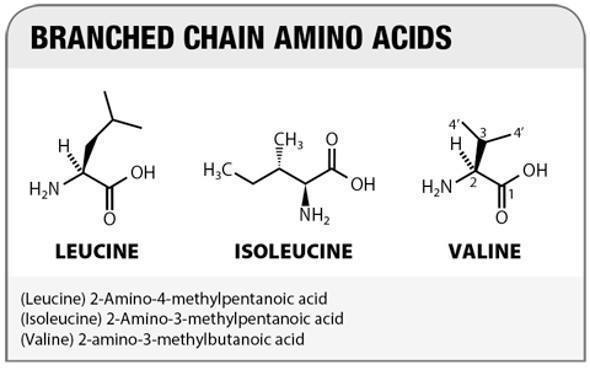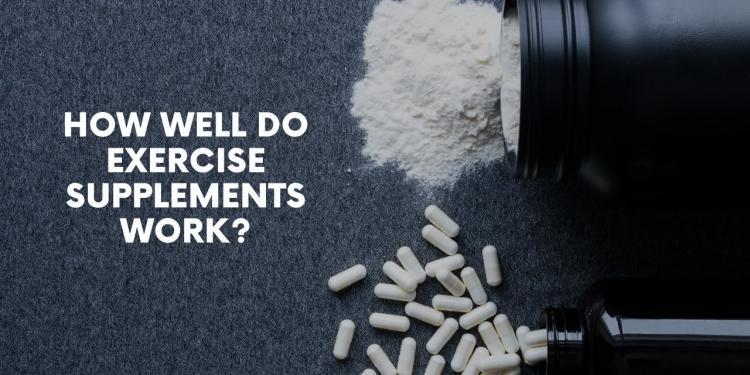Vitamin and supplements companies promise us a world of benefits to our health, our wellness and our fitness. With so many miraculous results just a pill or a tablet way, it’s no wonder the industry is projected to hit nearly $195 billion in sales in the next five years.
But does the science back their claims?
A massive study published last year in the Annals of Internal Medicine followed more than 30,000 American adults and found that in most cases, the promises made by such companies were unfounded or even harmful.
Thankfully, researchers have identified specific exercise supplements that may actually improve your fitness, boost your workouts, speed up your recovery and help you hit your health and wellness goals.
The Five Best Supplements for Athletes
1. Branched Chain Amino Acids (BCAAs)
While there are dozens of amino acids, there are only three types of BCAAs:

- Leucine
- Isoleucine
- Valine

Dietitians and exercise physiologists label BCAAs as “essential” because unlike other amino acids, your body can’t produce its own leucine, isoleucine and valine. And each of these BCAAs have a distinct function.
Leucine is linked with tissue healing and repair, as well as building muscle mass and improving exercise recovery. Isoleucine may boost energy and endurance, and also helps your blood to carry oxygen. And valine may help to enhance your energy and metabolism, and works in balance with the previous two amino acids.
Thus, it’s critical that athletes and fitness enthusiasts get enough of these BCAAs in their diet (or from BCAA supplements if the athlete’s diet isn’t sufficient).
See the BCAA supplement we recommend
Studies differ on the exact percentage. Some researchers speculate that BCAAs provide 3% to 18% of the energy in your muscles, while others estimate it at 14% to 18%.
Regardless of the exact percentage, it’s clear that all three BCAAs are critical for muscle energy, thereby directly impacting your muscle strength and your muscle endurance when you’re playing a sport or working up a sweat in the gym.
But BCAAs play a role far beyond simply fueling your muscles.
First, according to numerous studies published in the Journal of Nutrition (examples here, here and here), BCAAs help your body to build and synthesize protein. This is key because your body requires protein to fuel your workout and repair and rebuild post-workout. Enhanced protein synthesis may enhance both processes.
Second, BCAAs may help to balance your blood sugar levels, reports studies published in the Biochemical and Biophysical Research Communications journal, the American Journal of Physiology-Endocrinology and Metabolism, and the Journal of Nutritional Science and Vitaminology.
Healthy blood sugar levels means your muscles are better able to respond to insulin (important for muscle growth) and glucose uptake (essential for muscle endurance).
Third, BCAAs have been shown to reduce delayed onset muscle soreness (DOMS) and minimize exercise-induced muscle damage.
Finally, BCAAs may help with your mood and mindset. For example, research in the Journal of Nutrition noted that BCAAs helped with your brain's serotonin levels, thus reducing perceived levels of fatigue when people were exercising.
Taking a bird’s eye view of BCAA research leads to the conclusion that BCAAs work well for:
- Improving energy while exercising
- Protecting against fatigue
- Helping you to metabolize and synthesize protein
- Supporting muscle repair, muscle growth and muscle strength
Unfortunately, there’s no standard recommendation on how much BCAAs you should have to achieve these myriad benefits.
Depending on the specific study you choose, you may experience benefits on 12 grams or more of BCAAs a day for men, and at least 9 grams of BCAAs daily for women.
But don’t forget that you can also get BCAAs via whole foods. The International Sports Sciences Association recommends lean meats, eggs, tofu, quinoa and dairy products as rich sources of BCAAs.
2. Choline
A whopping 90% of American men and women don’t get enough choline (or vitamin B4) in their diets. And if you are working out hard, you definitely need choline.
This is big news because according to the National Institutes of Health, choline is needed for the formation of every cell in your body, including your muscles. The NIH also points out that choline is essential for healthy muscle control.
Meanwhile, a study published in the American Journal of Clinical Nutrition found that adults who did not get enough choline experienced muscle damage.
Secondary benefits of choline include better memory, improved circadian rhythm (proper sleep is key for exercise recovery and human growth hormone production) and a healthy cardiovascular system.
Some of the best dietary sources of choline include beef liver, eggs, chicken and broccoli. If you prefer an exercise supplement, men should aim for 550 mg of choline a day, while 425 mg a day is adequate for women. However, if you are training intensely for competition, 1 gram of choline is recommended.
3. Protein
Protein provides the building blocks of your muscles and your entire body. Your body needs it to fuel your workout, and your muscles need it to replenish their energy stores after you’ve hit them hard in the gym.
"Protein is a powerful macronutrient," reports the American Council on Exercise. The council points out that proper protein intake is linked with improved metabolism and fat burning, an increase in muscle mass, improvements in post-workout recovery, and improved cognition and mood.
Athletes should aim for approximately 2 grams of protein per kilogram of body weight, recommends the Academy of Nutrition and Dietetics. But for optimal exercise performance, WHEN is just as important as HOW MUCH.
Many athletes and fitness enthusiasts drink a protein shake immediately after a workout, and for right reasons! Several studies (examples here and here) found that your body is better able to metabolize and use protein when ingested right after exercise, thus enhancing your post-workout recovery.
We recommend this protein supplement
4. Creatine
Creatine didn’t begin to grow in popularity as an exercise supplement until the 1970s. That's when researchers realized that when it was taken as a supplement, your body turned creatine into creatine phosphate.
That’s important because your body needs creatine phosphate to create the energy used to contract your muscles during a workout.
Dr. Richard Kreider is one of the world’s top researchers on creatine. “Other than carbohydrates, creatine is the most widely used supplement to enhance strength/power performance and training adaptations,” he told Texas A&M University in a recent interview.
Research published in the Journal of the American College of Nutrition noted that 95% of the creatine in your body is actually stored in your muscles and used for muscle energy. This creatine is used up when your muscles contract (e.g. during exercise).
Creatine supplements help replenish these creatine stores faster, leading to improved workout performance.
And those improvements are quite significant.
For example, a study in the International Journal of Sport Nutrition and Exercise Metabolism found that creatine supplementation boosted testosterone levels by 20% and increased the study participants' maximum bench press and squat strength.
And it’s hardly the only study done on creatine.
A review of approximately 500 different research studies found that 70% of published studies showed a positive, significant improvement in exercise performance when athletes took a creatine supplement, while 30% of the studies showed a small effect.
The same review also found that creatine supplements enhanced maximal power/strength, as well as muscle contractions, by up to 15%.
“The most effective way to increase muscle creatine stores is to ingest 5 g of creatine monohydrate (or approximately 0.3 g/kg body weight) four times daily for 5–7 days,” reports the International Society of Sports Nutrition.
5. Nitrates
Without getting too deep into your college chemistry textbooks, nitrates are a compound comprised of one nitrogen atom and three oxygen atoms. They're naturally found in many vegetables and fruits.
"Dietary nitrate is growing in popularity as a sports nutrition supplement," points out the Sports Medicine research journal.
When taken as a supplement, your body turns nitrate into nitric oxide. "Intriguingly, nitrate supplementation reduces the oxygen cost of submaximal exercise and can, in some circumstances, enhance exercise tolerance and performance," explains the journal.
This may have more to do with the final form of nitric oxide in your body and not the nitrate supplement itself. Nitric oxide helps to widen your blood vessels and triggers the release of human growth hormone.
Wider blood vessels means more oxygen and nutrients get delivered to your muscles. This may be especially beneficial for athletes who engage in endurance sports, such as cycling or running.
One study of cyclists found significant improvements in performance and muscle fatigue when cyclists took a nitrate supplement. Another double-blind, randomized study, this time done on CrossFit athletes, found peak power increased significantly 24 hours after taking a nitrate supplement.
Unfortunately, most studies so far have been on relatively small groups of athletes. More research needs to be done on this new sports supplement. However, preliminary evidence suggests that benefits kick in when taking approximately 0.01 mmol of nitrate supplementation per kilogram of body mass.
A Word of Caution
Just because it’s “natural” or marketed as “healthy” doesn’t mean it doesn’t have side effects or potential interactions with other supplements or medications that you’re currently taking.
Before making adjustments to your supplement intake or your diet, consult your doctor or a medical professional to ensure dosages are appropriate for your lifestyle, your workout regimen, and your fitness and wellness goals.




